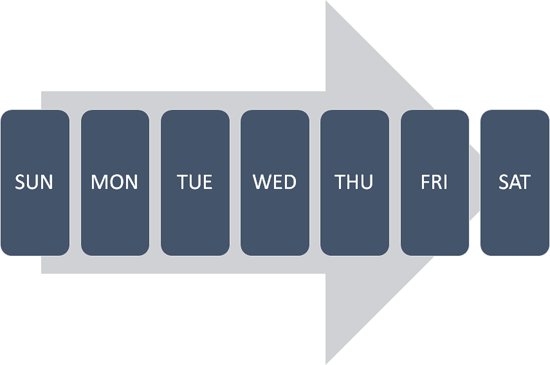Over the years, I’ve read several books on time management. I’d like to be able to say that I’ve put all that good advice into practice. But the truth of the matter is that I’m regularly overbooked and need refresher courses (and inspiration) to do a better job managing my time.
My latest foray into this subject matter came by way of Laura Vanderkam’s book 168 Hours (for which the subtitle is You have More Time That You Think). The title comes from the total hours in one week – a period sufficient to get a true picture of how we spend our time and to consider how we might allocate this precious resource better.
Time is an interesting concept. One the one hand, it’s not infinite; there are a fixed number of hours in every week into which we must fit all of our activities. On the other hand, you can fit a whole lot of life into 168 hours when using time wisely. Unfortunately, many of us fritter that resource away and wind up feeling like we’re scrambling to get everything done.
Here’s the basics of Laura’s time management planning process:
First: Do a time log over the course of a few weeks to see exactly how you are spending your time. Categorize your time into meaningful categories and subcategories. Be especially attentive to how you spend your work hours. Pay attention to how much of that time is truly productive versus just logging hours. Once you’ve got meaningful data, ask yourself: Is this really how I want to spend my time? Where can I make adjustments?
Second: Create a list of “100 Dreams” (or “1000 Dreams”) to provide fuel for exercising your passion muscles. Consider how these items might factor into your work life and provide rewarding ways to spend non-work hours.
Third: Identify your core competencies. These are things at which you are natively skilled and for which you have sufficient interest, ability, and motivation for continuous improvement. They should be abilities that you can leverage in multiple spheres of influence and that you find meaningful and important. The happiest people spend most of their time exercising their core competencies. They get rid of, minimize, or outsource tasks that don’t leverage those skills.
Fourth: Start with a blank slate (Sunday through Saturday, 24 hours per day) and fill in the hours from the ground up. Start with the necessities and high priority activities – e.g., good quality sleep, personal hygiene, eating (including shopping and meal preparation), work, relationships (e.g., spouse, children, friends, colleagues). Think about what choices you can make to increase the percentage of time that exercises your core competencies. Most folks find that they have a lot of time remaining that can be filled with meaningful activities… some of which could simply be restful, restorative “me time.”
Fifth: Give some structure and purpose to leisure time. Laura says: “Time is too precious to be leisurely about leisure.” As a case in point, Neilson research tells us that the average American spends ~30 hours/week watching TV of which ~20 hours per week represents concentrated attention. Could that time be better spent thinking about creating a more vibrant career, more meaningful relationships, and/or improved health and vitality?
Finally: Be open and flexible as you start to re-architect how you spend your 168 hours per week. There may be things on your “list of dreams” that you thought were really important that turn out to be duds once you actually start factoring them in. That’s OK! You’ll be learning a lot about yourself in the process. It may even be the case that things you’ve always considered core competencies may not be things that really bring you joy or provide fuel for personal development. Again – that’s OK! Consider what else might provide a sense of freedom, excitement, or challenge.
One final piece of advice really landed for me: Learn how to fill bits of time with bits of activity. As a life long musician, I’ve allowed myself to become stuck on the idea that time spent practicing must come in hour long chucks. Yet if I have my piano or guitar at hand, there’s no reason why I can’t work on bits of music in 10 to 15 minute chunks.
